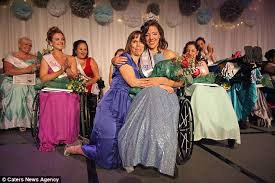by Erin Weist
I recently read this heartwarming story of Eliza McIntosh, a young woman who was lately crowned Ms. Wheelchair America, overcoming great odds and spending her time & energy encouraging others to live life to its’ fullest. Before birth she was diagnosed with a crippling disease, one that doctors predicted would leave her in a non-functioning state. Her parents were advised to consider an abortion but, being morally opposed to abortion, decided to move forward and help their daughter the best they were able. Perhaps unsurprisingly, Eliza was born more highly functioning than was anticipated, obviously bringing great joy to her family and to those around her as she grew and continued to break boundaries. (Not surprisingly, the local liberal paper made no mention of her shaky beginnings.)
I can’t help but think of other, less favorable, abortion stories around the world. Many point to China when speaking of abortion statistics, partly because of their population size and partly because of the one-child policy that reigned for so many decades. Stories such as these are coming out about the brutality of these policies (although I noted with wry disbelief the unassuming names given programs all involving the ubiquitous “family planning” moniker that is so deceptive and yet so familiar to similar programs in my own country). This article tells a similar story (indicating similar galling labels, such as the fine for multiple children called the “social maintenance fee”) but with changes hopeful in the future as the one-child policy comes to an end.
Likewise, changes are being sought in India, the second-most populous country in the world after China, in attempts to limit abortions sought based on gender. “Prenatal gender detection has been illegal since 1994,” the article states, in attempts to limit the number of girls aborted based on preference for boys in their society. Clearly, there is a line drawn somewhere in the sand with both of these countries. China is allowing more children, therefore reducing the need for abortions. India is attempting to cut down abortions based on female fetus rates in order to bring equality to the sexes. If these countries are changing decades of prejudice and beginning to see the value in human life, certainly other countries around the world can follow suit.
Do you agree a fetus has value if it is female? Or should she be aborted because of it?
Do you agree a second child has value in a home? Or should only one have the chance to be born?
Do you agree a doctor should advise abortion if a fetus will be born with disabilities? Or does every life, like that of Ms. Wheelchair America Eliza McIntosh, have value?
Not all of these values can live together, either abortion is right in all instances or wrong in all instances. Human life at every stage either has value or it doesn’t. And I believe Ms. McIntosh would agree. Thank you Ms. Wheelchair America for your example of indomitable human spirit.

